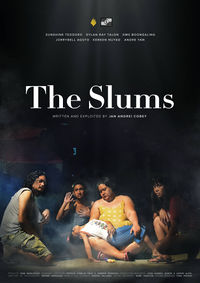The Slums: Difference between revisions
No edit summary |
m Text replacement - "http://iskwiki.upd.edu.ph" to "https://iskomunidad.upd.edu.ph" |
||
| (2 intermediate revisions by one other user not shown) | |||
| Line 1: | Line 1: | ||
'''The Slums''' | '''The Slums''' | ||
[[File:TheSlums.jpeg|200px|thumb|left|The Slums (2019)]] | |||
The Slums is a film about a poor family that hosts a documentary that covers the daily events of their household. However, the crew’s methods of documenting prove to be too much for the family, with the team constantly interfering with the family’s life in their coverage. The family reaches their breaking point when the crew accidentally drops the family TV, an object that is central to their life. The family then pounces on the team and grabs the camera from them, driving them away from the house. | The Slums is a film about a poor family that hosts a documentary that covers the daily events of their household. However, the crew’s methods of documenting prove to be too much for the family, with the team constantly interfering with the family’s life in their coverage. The family reaches their breaking point when the crew accidentally drops the family TV, an object that is central to their life. The family then pounces on the team and grabs the camera from them, driving them away from the house. | ||
| Line 5: | Line 7: | ||
The film talks about the various stereotypes and frames used by films, TV shows and other visual media in portraying the urban poor. Thus, the film uses the framing theory to explain the way an information is presented to an audience influences how an audience reacts to this information. Additionally, the film uses Orientalism to demonstrate how poverty porn content is used to present the Filipino identity to the international community. | The film talks about the various stereotypes and frames used by films, TV shows and other visual media in portraying the urban poor. Thus, the film uses the framing theory to explain the way an information is presented to an audience influences how an audience reacts to this information. Additionally, the film uses Orientalism to demonstrate how poverty porn content is used to present the Filipino identity to the international community. | ||
[ | [https://iskomunidad.upd.edu.ph/flipbook/viewer/?fb=2012-04988-2019_2_C View Thesis] | ||
[[Category: CMC Thesis]][[Category:Theses]][[Category:UP Film Institute Thesis]][[Category:2019 Thesis]] | [[Category: CMC Thesis]][[Category:Theses]][[Category:UP Film Institute Thesis]][[Category:2019 Thesis]] | ||
Latest revision as of 15:35, 17 June 2022
The Slums

The Slums is a film about a poor family that hosts a documentary that covers the daily events of their household. However, the crew’s methods of documenting prove to be too much for the family, with the team constantly interfering with the family’s life in their coverage. The family reaches their breaking point when the crew accidentally drops the family TV, an object that is central to their life. The family then pounces on the team and grabs the camera from them, driving them away from the house.
The film talks about the various stereotypes and frames used by films, TV shows and other visual media in portraying the urban poor. Thus, the film uses the framing theory to explain the way an information is presented to an audience influences how an audience reacts to this information. Additionally, the film uses Orientalism to demonstrate how poverty porn content is used to present the Filipino identity to the international community.


